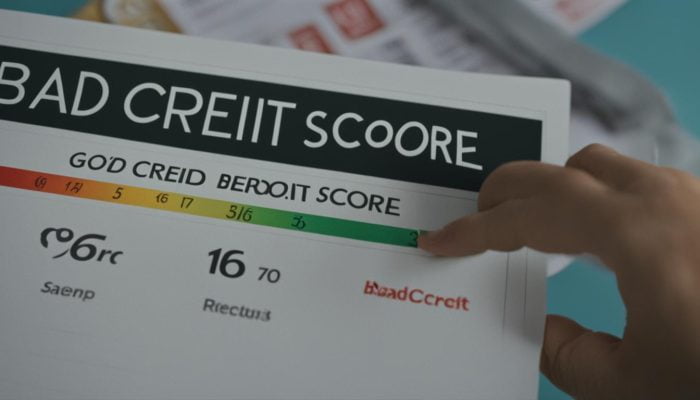Renting an apartment or house can be challenging when you have bad credit. However, with the right strategies and preparation, it is still possible to secure a place to live. This article will provide you with actionable tips on how to rent an apartment or house with bad credit. We will explore the importance of your credit history and how landlords conduct credit checks.

Key Takeaways:
- Understand the impact of bad credit on renting
- Focus on improving your credit score
- Build a positive rental history
- Explore alternative housing options
- Communicate openly with potential landlords
Understanding the Impact of Bad Credit on Renting
When it comes to renting an apartment or house, bad credit can have a significant impact on your ability to secure a place. Landlords often rely on credit scores and credit reports to assess the financial responsibility of potential tenants. If you have a poor credit score or negative marks on your credit report, it can signal to landlords that you may be unreliable in paying rent.
Having a bad credit score means that you have a history of late payments, defaults, or other financial missteps. Landlords view this as a risk, as they want to ensure that their tenants will consistently pay rent on time. In addition to credit scores, landlords also look at credit reports to get a more comprehensive view of an applicant’s financial history. These reports provide detailed information about your credit accounts, payment history, and any outstanding debts or delinquencies.
Understanding how bad credit affects your chances of renting is crucial in developing an effective strategy. It’s important to be proactive and take steps to address any negative information on your credit report. By improving your credit score and demonstrating financial responsibility, you can increase your chances of securing a rental property.
“Having a bad credit score can make it difficult to rent a property, but it’s not impossible. Landlords are looking for tenants who are responsible and dependable when it comes to paying rent. By taking steps to improve your credit and communicate openly with potential landlords, you can overcome the challenges of bad credit and find a place to call home.”
Now that we’ve explored the impact of bad credit on renting, let’s move on to the next section and discuss actionable strategies to improve your credit score.
Improving Your Credit Score
Improving your credit score is a crucial step in renting an apartment or house with bad credit. By taking proactive measures to address your credit utilization and reduce credit card debt, you can increase your chances of securing a rental property.
One effective strategy is to pay off outstanding debts and reduce your credit card balances. This not only demonstrates financial responsibility but also lowers your credit utilization rate, which is an important factor in determining your credit score. By keeping your credit utilization below 30%, you can show potential landlords that you are managing your credit responsibly.
“Paying off debts and reducing credit card balances are effective strategies for improving your credit score.”

In addition to managing your debts, it is essential to review your credit report regularly. Look for any errors or inaccuracies that may be negatively impacting your score. If you find any discrepancies, dispute them with the credit bureaus to ensure your credit report accurately reflects your financial situation.
Key Points:
- Paying off debts and reducing credit card balances can improve your credit score.
- Be mindful of your credit utilization ratio and aim to keep it below 30%.
- Regularly review your credit report for errors and dispute any inaccuracies.
Improving your credit score takes time and effort, but it is a worthwhile investment in your financial future. By taking steps to address your credit utilization and reduce debt, you can enhance your chances of renting an apartment or house, even with bad credit.
Building a Positive Rental History
When trying to rent with bad credit, building a positive rental history can significantly improve your chances of securing a place. Demonstrating your reliability as a tenant through consistent rent payments and maintaining a good relationship with your previous landlord can outweigh the negative impact of a poor credit score. Here are some key strategies to consider:
1. Pay Your Rent on Time
Consistently paying your rent on time shows potential landlords that you are responsible and trustworthy. Make it a priority to meet your rental obligations each month, even if it means adjusting your budget or setting up automatic payments. This will help establish a track record of timely rent payments, which can strengthen your rental application and increase your chances of approval.
2. Provide References from Previous Landlords
Obtaining positive references from your previous landlords can greatly enhance your rental prospects. Reach out to your previous landlords and ask if they would be willing to vouch for your responsible rental behavior. A reference highlighting your reliability, cleanliness, and adherence to lease agreements can go a long way in reassuring potential landlords about your creditworthiness.
3. Demonstrate Financial Stability
In addition to paying your rent on time, showcasing financial stability can help alleviate concerns about your bad credit. Provide documentation that proves your steady income, such as pay stubs or employment verification letters. This will demonstrate to landlords that you have the means to afford the rent and are less likely to default on payments.

| Rental History | Credit Score | Result |
|---|---|---|
| Timely rent payments, positive references from previous landlords | Poor credit score | Potential landlords may overlook bad credit due to strong rental history and references. |
| History of missed rent payments, negative references from previous landlords | Poor credit score | Bad credit and rental history may raise concerns for potential landlords. |
| Timely rent payments, positive references from previous landlords | Good credit score | Good credit and strong rental history can significantly boost your rental application. |
Building a positive rental history can compensate for a bad credit score and increase your chances of renting a house or apartment. By consistently paying your rent on time, obtaining references from previous landlords, and demonstrating financial stability, you can showcase your reliability as a tenant to potential landlords.
Exploring Alternative Housing Options
When traditional apartment complexes or housing rentals are not an option due to bad credit, it’s important to consider alternative housing options. These options can provide more flexibility and lenient credit requirements, increasing your chances of securing a place to live. Here are a few alternative housing options to explore:
Property Management Companies
Property management companies often have a wider range of rental properties available and may be more willing to work with individuals who have bad credit. They typically have their own leasing criteria, which may place less emphasis on credit scores and more on income and rental history. Contact property management companies in your area to inquire about available rentals and their credit requirements.
Find a Roommate with Good Credit
Consider finding a roommate with good credit to increase your chances of renting a home or apartment. Having a roommate with good credit can help alleviate some of the concerns that landlords may have about your credit history. It shows that there are additional financial resources and responsible individuals in the rental arrangement.
Rent a Home or Apartment Directly from an Individual Landlord
Individual landlords may have more flexibility when it comes to credit requirements compared to larger property management companies. They may be more willing to consider your application based on factors such as steady income, rental history, and personal references. Look for rental listings from individual landlords in your desired area and reach out to inquire about their credit requirements.

Exploring these alternative housing options can open up new possibilities for individuals with bad credit. Remember to thoroughly research the rental market in your area and be proactive in your search. By considering these options and taking the necessary steps to present yourself as a responsible tenant, you can increase your chances of finding a suitable place to live.
Offering Rent in Advance or a Higher Security Deposit
If you have bad credit and are struggling to rent an apartment or house, one strategy that can help is offering to pay rent upfront or providing a higher security deposit. This shows potential landlords that you are committed to fulfilling your financial obligations and can provide them with a sense of security. While this may not be an option for everyone, it can be a persuasive factor when trying to rent with bad credit.
By providing rent in advance, you demonstrate your willingness to prioritize your housing expenses and alleviate any concerns about late or missed rent payments. This can help landlords feel more confident in renting to you, despite your credit history. Additionally, offering a higher security deposit can give landlords added reassurance that any potential financial risks associated with renting to someone with bad credit can be mitigated.

It is important to note that while offering rent in advance or a higher security deposit can improve your chances of securing a rental property, it may not completely override the concerns that landlords have about your credit. It is still recommended to work on improving your credit score and building a positive rental history, as these factors can also influence a landlord’s decision.
Communicating with Potential Landlords
When you have bad credit, open and honest communication with potential landlords is crucial in securing an apartment or house. Taking the time to explain your situation and highlighting any extenuating circumstances that may have contributed to your credit issues can help build trust. Remember, honesty is key, and providing additional documentation or references that accurately reflect your credit history can further support your case.
During your communication with potential landlords, emphasize your commitment to fulfilling your financial obligations. Assure them that despite your credit challenges, you are actively taking steps to improve your situation. Offering to pay rent in advance or providing a higher security deposit can demonstrate your commitment and provide landlords with a sense of security.
Remember to approach potential landlords with professionalism and confidence. Be prepared to answer any questions they may have about your credit history and show them that you are actively working towards improving your financial situation. By effectively communicating your circumstances and demonstrating your reliability as a tenant, you can increase your chances of securing an apartment or house, even with bad credit.
Seeking Professional Help and Assistance
If you’re struggling to navigate the challenges of renting with bad credit, seeking professional help and assistance can be a valuable resource. Credit counseling agencies are available to provide guidance and support in improving your credit score and managing your finances effectively.
One reputable resource is the National Foundation for Credit Counseling. They offer a range of services, including credit counseling sessions where you can work with a certified counselor to develop a personalized plan for improving your credit. These sessions can provide valuable insights and strategies tailored to your specific situation.
Additionally, there are housing assistance programs that cater to individuals with low credit scores. These programs can help you find affordable housing options and provide support in navigating the rental process. Research and reach out to these programs in your area to explore the resources and assistance they can offer.
Remember, seeking professional help and assistance is not a sign of weakness but a proactive step towards achieving your goal of renting with bad credit. Take advantage of the resources available to you and utilize the expertise of professionals who can guide you on your journey.

Quotes:
“Seeking professional help and assistance can provide valuable guidance in improving your credit score and managing your finances effectively.” – National Foundation for Credit Counseling
Table: Credit Counseling Agencies
| Agency | Contact Information |
|---|---|
| American Consumer Credit Counseling | Phone: 800-769-3571 Email: [email protected] |
| GreenPath Financial Wellness | Phone: 800-550-1961 Email: [email protected] |
| Money Management International | Phone: 866-889-9347 Email: [email protected] |
Table: Housing Assistance Programs
| Program | Contact Information |
|---|---|
| Section 8 Housing Choice Voucher Program | Phone: 800-955-2232 Email: [email protected] |
| Low-Income Home Energy Assistance Program | Phone: 866-674-6327 Email: [email protected] |
| Rental Assistance Program | Phone: 800-569-4287 Email: [email protected] |
Reviewing Your Legal Rights
When it comes to renting with bad credit, it’s important to understand your legal rights as a tenant. Familiarizing yourself with fair housing laws and tenant rights in your area can protect you from unfair treatment and empower you to advocate for yourself during the rental process. Landlords are prohibited from discriminating against potential tenants based solely on their credit score.
Under fair housing laws, it is illegal for landlords to deny housing or impose different terms and conditions based on a person’s credit score. This means that even if you have bad credit, you still have the right to be considered for rental properties on the same basis as other applicants. Landlords must evaluate all potential tenants using consistent criteria and cannot single out individuals with poor credit.
In addition to fair housing laws, familiarize yourself with tenant rights specific to your jurisdiction. These rights may vary by state, but common protections include the right to a habitable living environment, the right to privacy, and protection against discriminatory practices. Understanding your rights as a tenant can help you navigate the rental process and ensure you are treated fairly.
Table: Tenant Rights
| Tenant Right | Description |
|---|---|
| Habitability | Tenants have the right to a safe and livable rental unit, free from hazards and in compliance with building codes. |
| Privacy | Tenants have the right to privacy within their rental unit, and landlords must provide notice before entering the premises. |
| Non-Discrimination | Tenants have the right to be free from discrimination based on protected characteristics, including credit score, in the rental process. |
| Security Deposits | Tenants have the right to the return of their security deposit, minus legitimate deductions, within a certain timeframe after the lease ends. |
It’s important to remember that while you have rights as a tenant, it’s also essential to fulfill your responsibilities. Paying rent on time, maintaining the property, and following the terms of your lease agreement are all crucial to maintaining a positive landlord-tenant relationship.
By understanding your legal rights as a tenant and being aware of fair housing laws, you can navigate the rental process with confidence, even with bad credit. Remember, your credit score should not be the sole determining factor in the landlord’s decision. Focus on highlighting your rental history, providing references, and communicating openly with potential landlords to increase your chances of securing a rental property.
FAQ
How does bad credit affect my ability to rent an apartment or house?
Landlords often rely on credit scores and credit reports to assess the financial responsibility of potential tenants. A poor credit score and negative marks on your credit report can signal to landlords that you may be unreliable in paying rent.
How can I improve my credit score to increase my chances of renting with bad credit?
Paying off outstanding debts, reducing credit card balances, and maintaining a low credit utilization rate are all effective strategies to improve your credit score. Regularly reviewing your credit report and addressing any errors or inaccuracies is also crucial.
Can a positive rental history outweigh a poor credit score?
Yes, a positive rental history can be a valuable asset when trying to rent with bad credit. Consistently paying your rent on time and maintaining a good relationship with your previous landlord demonstrates your reliability as a tenant. Providing references from previous landlords who can vouch for your responsible rental behavior can also help.
What are some alternative housing options to consider if I have bad credit?
Property management companies may have more lenient credit requirements, and renting a home or apartment directly from an individual landlord could provide more flexibility. Finding a roommate with good credit can also alleviate some concerns that landlords may have.
Can offering to pay rent upfront or providing a higher security deposit help me rent with bad credit?
Yes, offering to pay rent upfront or providing a higher security deposit can help alleviate concerns that landlords may have about your bad credit. This shows your commitment to fulfilling your financial obligations and provides landlords with a sense of security.
How important is open and honest communication with potential landlords when renting with bad credit?
Open and honest communication is crucial when trying to rent with bad credit. Take the time to explain your situation, highlighting any extenuating circumstances that may have contributed to your credit issues. Offering to provide additional documentation or references that accurately reflect your credit history can help build trust and increase your chances of securing an apartment or house.
Where can I seek professional help and assistance if I am struggling to rent with bad credit?
Credit counseling agencies can provide guidance on improving your credit score and managing your finances. Additionally, exploring housing assistance programs that cater to individuals with low credit scores can be beneficial. The National Foundation for Credit Counseling is a reputable resource that can provide valuable information and support.
What should I know about fair housing laws and tenant rights when renting with bad credit?
It is illegal for landlords to discriminate against potential tenants based solely on their credit score. Familiarize yourself with fair housing laws and tenant rights in your area to protect yourself from unfair treatment and empower yourself to advocate for yourself when trying to rent with bad credit.
Conclusion:How to Rent an Apartment or House with Bad Credit
Renting a house or apartment with bad credit may present challenges, but it is not impossible. By following the strategies outlined in this article, you can increase your chances of securing a rental property. Remember to focus on improving your credit score, building a positive rental history, and being proactive in your communication with potential landlords. With determination and perseverance, you can find a place to live, even if you have bad credit.